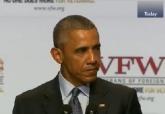Updated January 20, 2016
The Million Veteran Program may play an important role in the recently announced cancer "moon shot." President Barack Obama and Vice President Joe Biden are promising to marshal federal and private resources to battle against cancer. Beginning with a bold announcement at the President’s State of the Union address, delivered January 12, and followed up by a slightly more detailed plan put forth by Biden a day later, the White House is focused on battling cancer by breaking down silos and increasing both public and private resources.
“The goal of this initiative — this ‘Moonshot’ — is to seize this moment,” Biden explained in a blog post. “To accelerate our efforts to progress towards a cure, and to unleash new discoveries and breakthroughs for other deadly diseases.”
Noting advances in immunotherapy, genomics and combined therapies, Biden argued that great strides have been made in cancer research, but the results are not necessarily reaching patients. “The science, data, and research results are trapped in silos, preventing faster progress and greater reach to patients,” Biden insisted. “It’s not just about developing game-changing treatments — it’s about delivering them to those who need them.”
Biden pledged that the federal government “will do everything it possibly can— through funding, targeted incentives, and increased private-sector coordination — to support research and enable progress.” Unclear, however, is whether the VA or the Murtha Cancer Center at Walter Reed National Military Medical Center will be involved in the effort. Later this month Biden will meet with cabinet secretaries and heads of relevant agencies to discuss ways to improve federal investment and support of cancer research and treatment.
VA Secretary Bob McDonald recently toured a Million Veteran Program (MVP) repository in Boston and touted the potential role in could play in the cancer moon shot, according to Military.com. Veterans who participate in the program donate blood for DNA extraction, which is linked to their health records. Created in 2012, MVP was expected to take 5 to 7 years to reach 1 million participants and already has registered more than 400,000 participants.
According to Politico, Biden has already made significant progress. The White House has a detailed plan leveraging the work of the National Institutes of Health (NIH) and private organizations that can compress 10 years of work into 5. The NIH is one of the few agencies that has received more funding from Congress in the latest budgets.
Medical and cancer organizations met the announcement with widespread approval. The American Association for Cancer Research (AACR) applauded the commitment to curing cancer. “We have indeed reached an inflection point, where the number of discoveries that are being made at such an accelerated pace are saving lives and bringing enormous hope for cancer patients, even those with advanced disease,” Dr. José Baselga, AACR president, said in a statement. “Now is the time for a major new initiative in cancer science that supports and builds upon our basic science foundation while translating these exciting scientific discoveries into improved treatments for cancer patients, such as in the areas of genomics, precision medicine, and immuno-oncology.”
“Vice President Biden’s call to leading cancer centers to break down silos and reach unprecedented levels of cooperation to enhance the effectiveness of cancer treatment, and for the oncology community to improve communication so that the care provided to patients at the world’s best cancer centers is available to everyone who needs it, echoes the work and mission of NCCN and our Member Institutions,” said Robert W. Carlson, MD, chief executive officer of the National Comprehensive Cancer Network (NCCN). “NCCN stands with President Obama, Vice President Biden, and their Administration on this crucial initiative, and we look forward to working to advance the goals of the initiative. It is time that people stop dying of cancer.”
The American Society of Clinical Oncology (ASCO) concurred. “With nearly 1.7 million people in the United States diagnosed with cancer each year, and the incidence of cancer expected to rise to 2.3 million cases per year by 2030, it is imperative that we do all we can to bring more effective treatments from the laboratory bench to the patient’s bedside as quickly as possible,” Richard L. Schilsky, MD, ASCO chief medical officer, said in a statement. “We must recommit to vastly speeding the discovery of new cancer treatments and enabling the possibility of precision medicine for every individual with cancer.”











